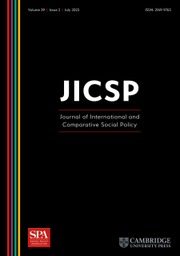Article contents
Situating informal welfare within imperfect well-being regimes
Published online by Cambridge University Press: 09 March 2020
Abstract
This paper reflects upon the position of the nation state and non-state-centred actors in the support for welfare and the security of agency. In particular it argues that the normative agenda of rights-based autonomous security is undermined by the social facts of dependent, personalised and thus precarious security. The roles of other actors above and below the nation state are thus significant in any analysis of power relations, social reproduction and policy outcomes. In many middle- and lower-income countries, the problem for state actors is that power, authority and, more problematically, legitimacy lies significantly elsewhere across the domain of state, market, community and household. Aspects of globalisation can thereby interact directly with sub-national entities by-passing and undermining the state: multinational corporations, international donors, international non-governmental organisations, remittances, wider faith movements and cross-border ethnic solidarities. This is clearly a complicated institutional landscape within which to formulate the idea of responsibility for social policy and consider its intersecting role with international development.
- Type
- Research Article
- Information
- Copyright
- Copyright © 2015 Taylor & Francis
References
- 10
- Cited by


